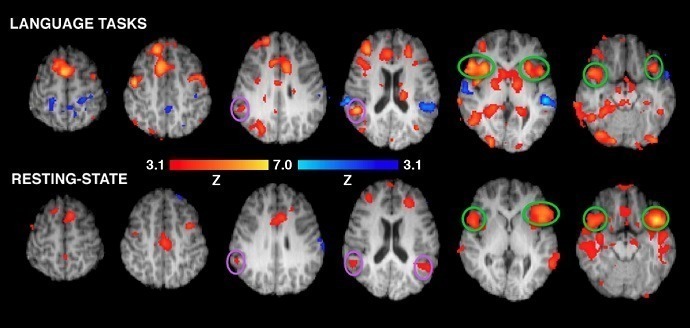Study: Brain scans mapping language and memory areas can help guide epilepsy-related surgeries

—Language task fMRI and resting-state fMRI data from a presurgical patient with left temporal lobe epilepsy. Copyright Bradley Goodyear, Einat Liebenthal and Victoria Mosher.
Can brain scans help doctors navigate epilepsy surgery? (UPI)
“…When medication doesn’t effectively control epilepsy, surgery may be recommended. Doctors can remove the part of the brain that triggers seizures or use certain procedures to control seizure activity.
Before surgery, however, the brain must be “mapped” to ensure the regions responsible for language and memory aren’t damaged during the procedure, the study authors explained…
“Because fMRI is becoming more widely available, we wanted to see how it compares to the Wada test,” said study author Dr. Jerzy Szaflarski, of the University of Alabama at Birmingham…The new guidelines, published online Jan. 11 in the journal Neurology, are based on a systematic review of existing evidence, the study authors said.
The guidelines’ authors found some evidence that fMRI could be an alternative to the Wada test for people with specific types of epilepsy.”
Study: Practice guideline summary: Use of fMRI in the presurgical evaluation of patients with epilepsy (Neurology). From the abstract:
- Objective: To assess the diagnostic accuracy and prognostic value of functional MRI (fMRI) in determining lateralization and predicting postsurgical language and memory outcomes.
- Results and recommendations: The use of fMRI may be considered an option for lateralizing language functions in place of intracarotid amobarbital procedure (IAP) in patients with medial temporal lobe epilepsy (MTLE; Level C), temporal epilepsy in general (Level C), or extratemporal epilepsy (Level C). For patients with temporal neocortical epilepsy or temporal tumors, the evidence is insufficient (Level U). fMRI may be considered to predict postsurgical language deficits after anterior temporal lobe resection (Level C). The use of fMRI may be considered for lateralizing memory functions in place of IAP in patients with MTLE (Level C) but is of unclear utility in other epilepsy types (Level U). fMRI of verbal memory or language encoding should be considered for predicting verbal memory outcome (Level B). fMRI using nonverbal memory encoding may be considered for predicting visuospatial memory outcomes (Level C). Presurgical fMRI could be an adequate alternative to IAP memory testing for predicting verbal memory outcome (Level C). Clinicians should carefully advise patients of the risks and benefits of fMRI vs IAP during discussions concerning choice of specific modality in each case.
To learn more:


